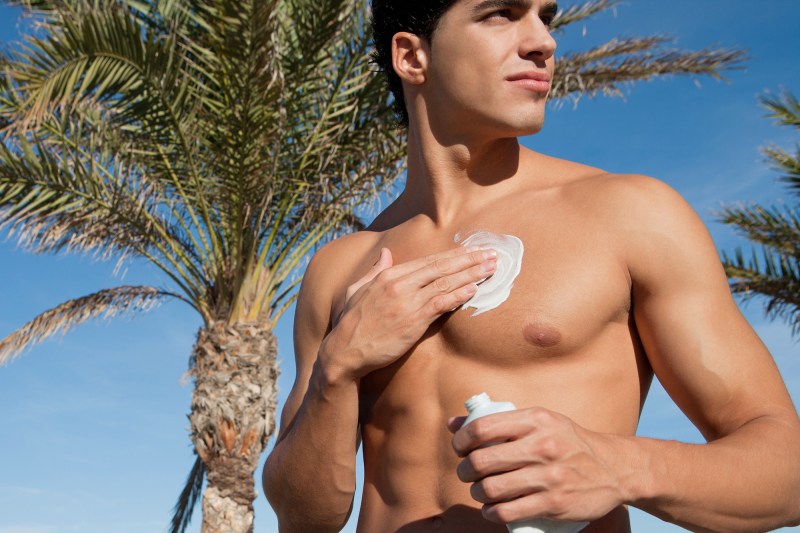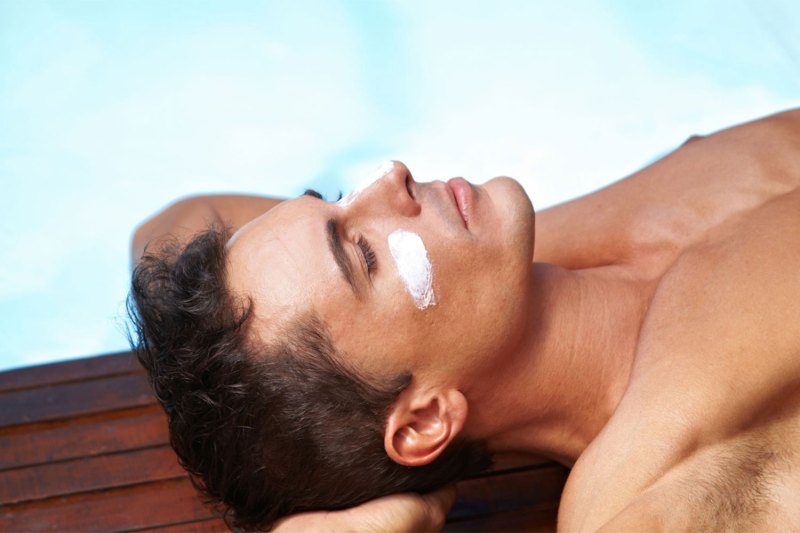
Like brushing your teeth, applying sunscreen should be a daily habit. It’s the single most important part of your skincare routine, and there really isn’t any point in applying expensive moisturizers and serums without first protecting your skin from damage. Sunscreen, in fact, is integral to your overall health. Dr. Asmi Sanghi, a dermatologist at Mount Sinai Health System, said that “using it properly can help prevent skin damage, premature aging, and skin cancer.”
Still, the vast majority of people do not take the proper precautions necessary for prolonged sun protection. “Most people only apply 25%-50% of the recommended amount of sunscreen,” stated NYC dermatologist Dr. Hadley King, MD-FAAD. “The guidelines are to apply one ounce, that’s enough to fill a shot glass.”
In other words: Lather up. With summer around the corner, we spoke with a number of medical experts to cover all the misconceived notions you may have about sunblock.

Not all sunscreen is created equal
There are two different types of suntan lotion: “physical” and “chemical,” according to Doctor Naiara Fraga Braghiroli, Chief of Skin Cancer at Miami Cancer Institute.
“The differences between the two are in the way they interact with the skin and the way they reflect light,” she told us. “Physical sunscreens work like a shield, sitting on the surface of your skin and reflecting away UV sunlight, whereas chemical sunscreens work like a sponge, absorbing the sun’s rays.”
Typically you would want to use a “physical” sunscreen — one that contains zinc oxide or titanium dioxide. These are proven safe for your skin and safe for the environment.
Sunscreen isn’t ‘one and done’
This was the advice we heard most from our experts: Sunblock should be reapplied at least every two hours in order to remain effective. Your morning sunscreen application won’t last all day, especially if you’re out in the sun for periods at a time. Biochemist and science lead at OnSkin, Valerie Aparovic explained, “The effect starts decreasing as active substances tend to break down over time [when] exposed to the sun, water, or sweat.”
It’s true that higher SPF can last longer, but even SPF 100 needs to be reapplied at least a few times throughout the day. Aparovic stated, “It’s recommended to wear no less than 30 SPF, but ideally 50.”

Makeup won’t cover it
Makeup, moisturizers, or anything else that contains SPF — but isn’t full-fledged sunscreen — isn’t enough for all-day protection. Most makeups or moisturizers contain less than the recommended 30 SPF. While they’re a nice additive for your sun protection, you need to use actual sunscreen as well.
“While some makeup contains SPF, it’s often not enough to provide adequate protection,” stated senior consultant dermatologist at RenaissanceDerm, Dr. Noor Hanif Said. “Always apply a broad-spectrum sunscreen beneath your makeup for optimal defense against UV rays.”
The same goes for any other accessories meant to block the face from the sun — including your sunglasses and hats.
Sunscreen isn’t only for sunny days
There are two kinds of UV light, and both are harmful to the human body in different ways. Ultraviolet A (UVA) rays are associated with skin aging, while ultraviolet B (UVB) rays cause sunburns. However, both types of UV rays contribute to skin cancer.
You need to wear sunscreen daily, regardless of the weather outside. Harmful UV rays from the sun can get through both clouds and windows, meaning you can feel the sun’s negative effects even indoors.
“While you won’t get a sunburn through windows, UVA light can penetrate windows,” says Dr. Leah Ansell of Treiber Dermatology. If you’re sitting at your desk in front of a window, you’ll still need to reapply throughout the day.
When choosing a daily sunscreen, it’s important to know what kind of protection you’re getting. Dr. Chaudhry, M.B.B.S. of Scandinavian Biolabs, told us, “Remember that SPF measures protection against UVB rays, not UVA rays, so choose a broad-spectrum sunscreen to protect against both types.”
You can usually find the words “broad-spectrum” somewhere on the bottle of your favorite sunscreen, meaning it offers protection against a wide spectrum of the sun’s rays.

Everyone needs sunscreen
Just because you’re not susceptible to burns doesn’t mean you’re not affected by the harmful UVA and UVB rays.
“Although darker skin tones have more melanin, which provides some natural protection against the sun’s harmful rays, it’s still important for everyone to wear sunscreen,” said Dr. Chaudhry, “People with dark skin can also develop skin cancer and experience premature aging due to sun exposure.”
Nobody is immune to the aging and cancer-causing properties of the sun, regardless if they can see visual cues or not.
Is lotion better than spray?
It depends, truthfully. Lotion sunscreen tends to have a higher SPF than spray sunscreen, but you can certainly find the right SPF in either form. Lotion sunscreen can be messier and feel heavier on your skin than spray sunscreen, but it also ensures that you have full-coverage protection.
It’s easier to miss a spot with spray sunscreen, and you’re more likely to have to reapply more often. That being said, if you are diligent about your sunscreen usage, a spray will work just fine. In fact, you may find that it’s easier to continue reapplying a spray over a lotion. At the end of the day, use whatever you are more comfortable with and what will keep you safe and sunburn-free.




